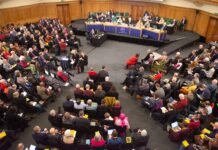Statements issued this week by the “GSFA Steering Committee” and the “Gafcon Primates Council” contain several inaccuracies, including the nature of the Anglican Communion, the appointment of the Dean of Canterbury, and the understanding of civil partnerships in England, a Church of England spokesperson has said.
The statements criticise the appointment of the new Dean of Canterbury Cathedral, the Very Revd David Montieth, because he is in a civil partnership. Much of the criticism levelled against the Dean-designate appears to be based on international confusion about the nature of such civil partnerships.
“A civil partnership in English law dates from 5 December 2005”, a C of E spokesperson said. “Civil partnerships are not recognised as marriage but are a legal means, not involving any church, by which two people (of the same or different gender) can create a bond which, for the purposes of secular law, gives them the same legal entitlements as if they were married.
“Some gay and lesbian English clergy have entered civil partnerships from near the beginning in 2005. They are still bound by the rule that sexual relationships must only be within marriage as recognised by the Church, and are not allowed by being in a civil partnership. Abstention from sexual relationships (celibacy) is required of all unmarried clergy, whatever their sexuality.
“Since 2005, in the Church of England, appointments have not been refused simply because the person concerned is in a civil partnership, so long as they obey the discipline of the church.”
At the Lambeth Conference of Anglican bishops, held earlier this year in Canterbury, the Archbishop of Canterbury said: “I neither have, nor do I seek, the authority to discipline or exclude a church of the Anglican Communion. I will not do so.”
The GSFA statement described this as “a lamentable position”; but an Anglican Communion Office spokesperson said today that “in saying this, the Archbishop was merely setting out the factual position of the nature of the Anglican Communion. None of the four Instrument of Communion has power over any single Anglican province. This has always been true.
“To change the Communion into a body with a central authority to discipline provinces would require the consent of all provinces concerned.
“The Churches of the Anglican Communion rejected such a central disciplinary body when they rejected a proposed Anglican Communion Covenant.”
The C of E spokesperson added: “Let us pray that the commitment made by bishops at the Lambeth Conference to walk together to the maximum degree possible despite our deeply-held differences will endure. Let us continue to build up our common life together on the solid rock of Jesus Christ who calls us to unity so that the world may know His love.”



